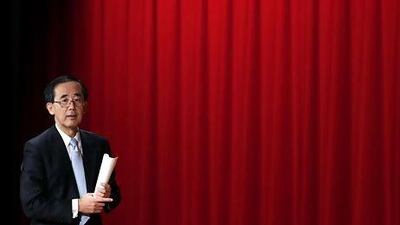The new prime minister, Shinzo Abe, has the chance to reshape the Bank of Japan next year, in what is regarded as one of the vital monetary policy events of 2013. Toru Fujioka reports
Shinzo Abe, the incoming Japanese prime minister, backed the central bank when it raised interest rates in 2006, a move he now says was a mistake. His shift may signal less tolerance for deflation in the third-largest economy.
Mr Abe, whose party swept to victory in elections for the lower house of Parliament, will have the chance to reshape the Bank of Japan (BOJ) next year, when the terms of its governor and two deputies expire. Mr Abe said he told the central bank governor Masaaki Shirakawa on Tuesday that he wants an accord with a 2 per cent inflation target. The BOJ was forecast to boost its asset purchases as soon as yesterday.
"This is one of the most important monetary policy events for 2013," said Bruce Kasman, the New-York based chief economist at JPMorgan Chase & Co. "It could potentially be similar to the major change in US monetary policy after the appointment of Paul Volcker."
American policymakers by the late 1970s recognised the broader costs of inflation to competitiveness and productivity, and backed the efforts of Mr Volcker, the then-Federal Reserve chairman, to contain it. Any similar shift by Japan with respect to ending deflation would diminish incentives to save and make it more attractive to borrow, a potential recipe for faster growth.
Mr Shirakawa told reporters that he hadn't discussed monetary policy at his meeting with Mr Abe. The new prime minister said he told the central bank chief that he had campaigned on ending deflation and correcting a strong yen.
The yen weakened 0.2 per cent to 84.01 per dollar in Tokyo on Tuesday after touching a 20-month low on the likelihood of more easing. The Nikkei 225 Stock Average closed up 1 per cent, heading for its sixth week of gains, while remaining about 75 per cent below a 1989 peak during an investment bubble.
Mr Kasman's colleague Masamichi Adachi in Tokyo said last week that the BOJ may this week adopt a "new style of open-ended asset purchases".
JPMorgan last week boosted its estimate for Japan's growth in 2013 to 0.4 per cent from zero, accounting for fiscal stimulus pledged by Mr Abe. Seventeen of 21 analysts surveyed by Bloomberg expect the BOJ to ease at a meeting this week.
While Japan's entrenched deflation helps retirees preserve wealth, younger generations are hit by falling wages and diminished incentives for borrowing crimp growth. Unemployment among those aged 15-24 was 7.5 per cent in October, compared with an unadjusted overall rate of 4.1 per cent.
The yen is still stronger than the 100 yen per dollar that the Nissan chief executive Carlos Ghosn said is the currency's "neutral range".
In the US, "people began to recognise inflation's broader cost and we saw a shift away from viewing it as acceptable," said Mr Kasman. "I don't think we've really seen an aggressive and committed effort to get Japan out of deflation. Political pressures are shifting in a way that may produce that fight."
Austerity measures in Europe and a territorial spat with China are dragging down Japan's exports, with the nation's economy shrinking in each of the past two quarters, meeting the textbook definition of a recession. Big manufacturers are the most pessimistic in almost three years. An ageing population and the world's biggest public debt make it harder to drive a sustained recovery.
"We have to get the economy out of deflation, correct the strong yen, create jobs and boost growth," Mr Abe said at a press conference. "That's our mission."
Mr Abe made increased cooperation between the government and the central bank a centrepiece of his campaign, saying last month that the BOJ "made a mistake" in stopping quantitative easing amid signs of economic recovery in 2006.
The BOJ ended its five-year policy of flooding the lending market with cash in March 2006, when Mr Abe was the chief cabinet secretary. Four months later, just before he became prime minister, the central bank raised its key lending rate for the first time in almost six years. By the third quarter of 2007, the economy was contracting and his popularity had slumped. He resigned, citing illness.
"The most important lesson Abe must have learnt was that the economy matters for his popularity," said Masayuki Kichikawa, the Tokyo-based chief economist at Bank of America Merrill Lynch. "Pushing the central bank may be the easiest solution for now due to the debt burden and because deregulation takes too long to realise."
Since Mr Abe resigned in September 2007, the Nikkei has fallen by around half as the yen has gained around 40 per cent against the dollar, while public debt has grown by a fifth to more than twice the size of the economy.
"There is a limit to what monetary policy can do," said Hiroshi Miyazaki, the chief economist at Shinkin Asset Management in Tokyo. "The government must try harder to help companies. Expectations on monetary policy are building up in the market but Japan's economy needs the government to address lowering growth expectations in a rapidly-ageing society."
The two-thirds majority won this week by a Liberal Democratic Party-led coalition in the lower house enables it to override most decisions by the opposition-controlled upper house. The upper chamber will have a say on Mr Abe's picks to replace Mr Shirakawa and his deputies because votes on nominations can't be overridden.
For now, two former private-sector economists on the BOJ's nine-member board show signs of favouring more aggressive stimulus, giving Mr Abe the chance to push for a pro-easing majority.
"This is going to be Abe's revenge," said Kazuhiko Ogata, the chief economist at Crédit Agricole. "He has rock-solid determination to push the BOJ for more stimulus."
* Bloomberg News

